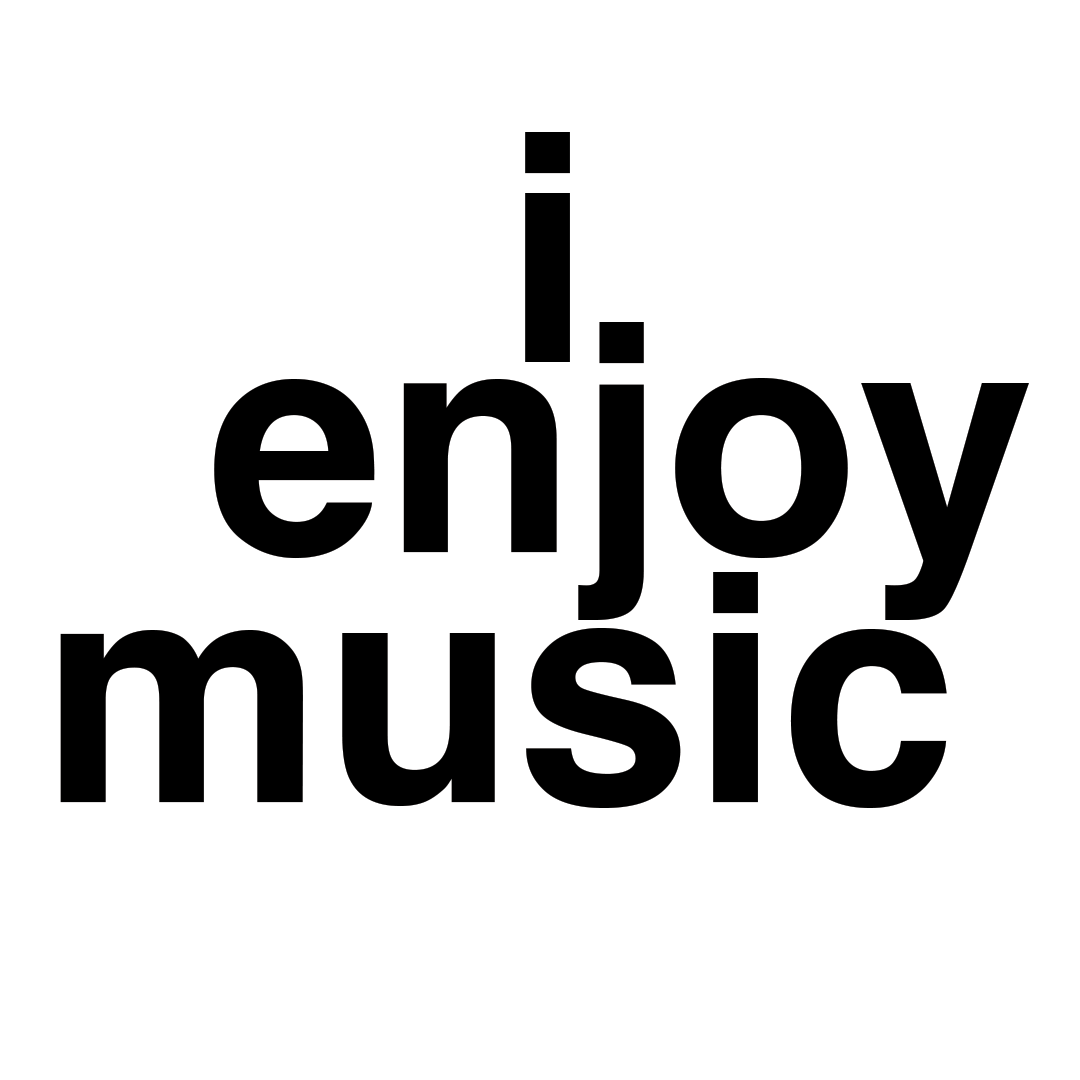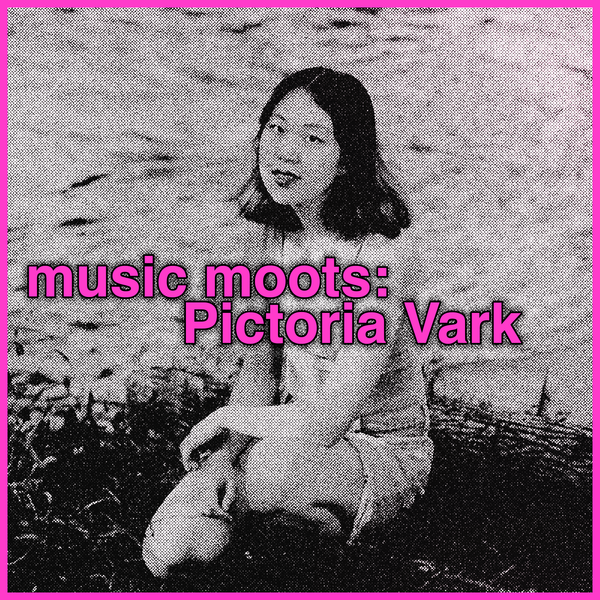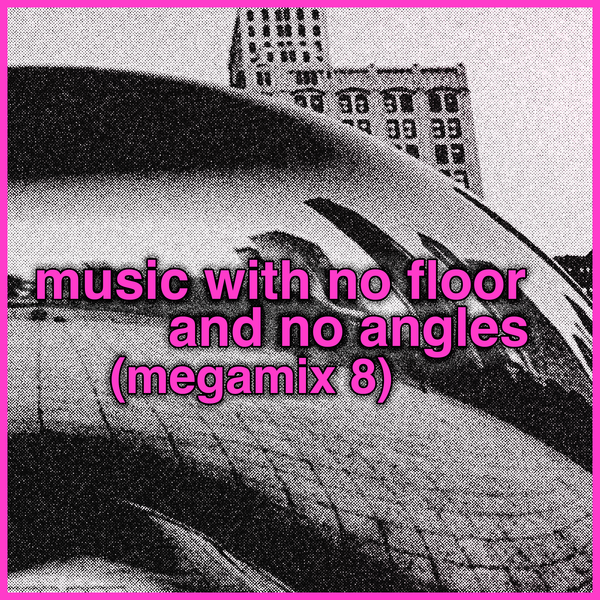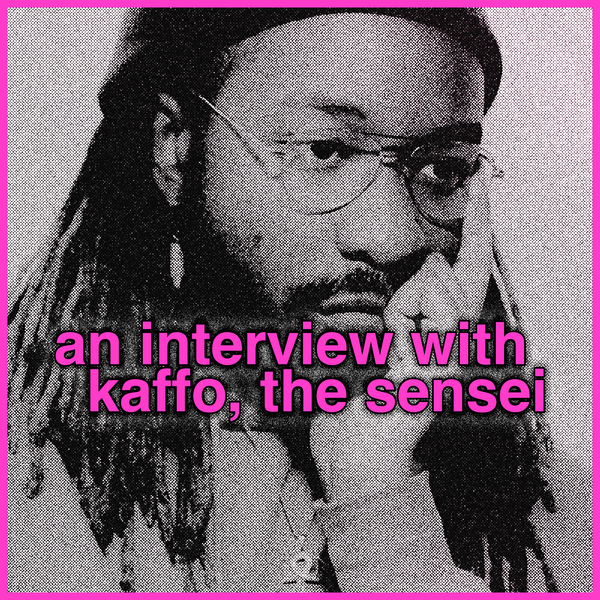stuck in the attention vortex with beyoncé and waxahatchee
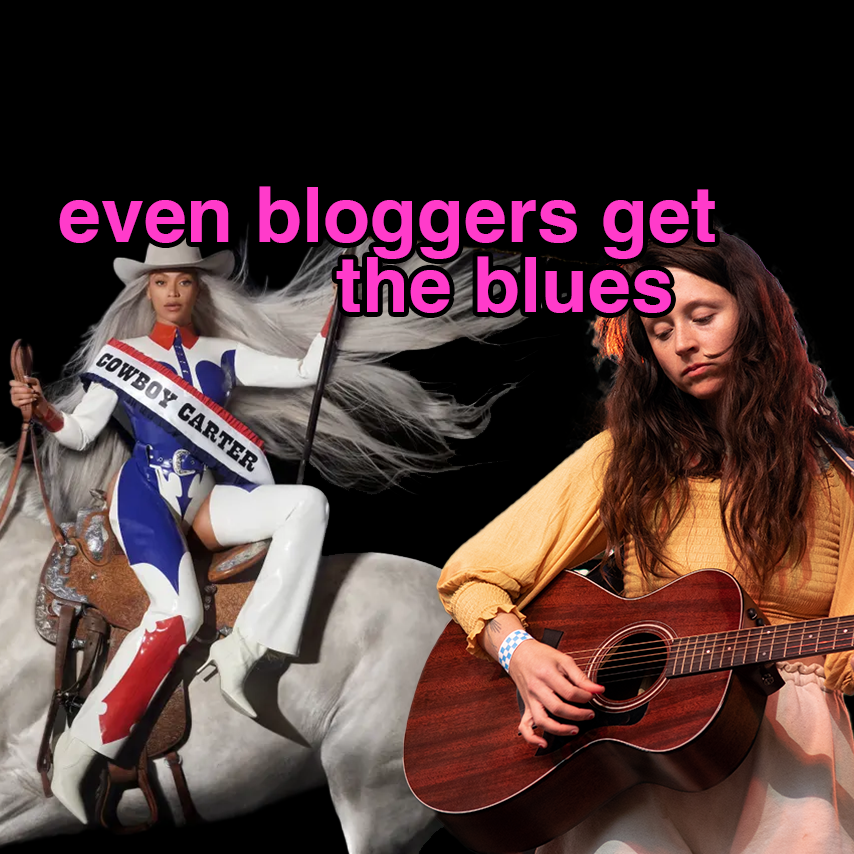
Two artists recently released albums, and I can't stop thinking of them as a pair. One is Waxahatchee's Tigers Blood, and the other is Beyoncé's Cowboy Carter.
Both albums are, if not straight-up country in genre, at the very least country-oriented. Beyoncé is from Texas, which is where Waxahatchee's Katie Crutchfield recorded Tigers Blood. Crutchfield is from Birmingham, Alabama, about an hour's drive from Gadsden, where Beyoncé's father grew up.
Beyoncé name-checks Gadsden in "AMERICAN REQUIIEM," the first of twenty-seven songs on Cowboy Carter; Crutchfield references "Bama heat" on Tigers Blood's "Lone Star Lake." Both women, though in radically different circumstances, are standing on the same latitude, feeling the same weather.
I can measure my fandom of both Beyoncé and Waxahatchee in multiple decades now, which is wild. Beyoncé's been around longer and louder for me; I'm old enough to have heard "Bills, Bills, Bills" on the radio as a child, and lucky enough to have seen Beyoncé's Coachella performance in 2018, an experience so mind-meltingly divine that attempting to describe it to others is like talking about a dream or a psychedelic trip—sure, bud, if you say so.
My peak connection to Album Release Mode Beyoncé was in 2013, when she surprise-dropped her self-titled album. I lived with my sisters then, and somehow we all were up at midnight when those 14 songs hit the iTunes store, with a gorgeous video accompanying each one, cash back. The next night, Friday night, we walked to a bar we knew had a lively dance floor, leaving our coats at home even though it was December. The DJ treated the crowd to at least a half-dozen Beyoncé songs. He played "Drunk In Love" twice. There I was, freshly 24 years old, shaking my ass to the newest and best music to exist at that moment. I felt electrically attached to the present, like I was jump-roping with a downed power line.
2013 is also the year I found Waxahatchee. I connected to that year's release, Cerulean Salt, so violently that I immediately tore through her other work—American Weekend, plus her output as part of Bad Banana and P.S. Eliot—like a dog savaging a plush toy.
I had gotten my heart broken pretty badly early that year. To put it closer to the truth, my heart had gotten its ass kicked. The spare, lo-fi bitterness of this version of Waxahatchee made a lot of sense to me. Lyrics like I said to you on the night that we met, "I am not well" and I tell you not to love me, but I still kiss you when I want to went down as smooth as the kind of whiskey I couldn't afford.
Trekking through a minor blizzard to see Waxahatchee play Mercury Lounge was a worthwhile pilgrimage. I remember slipping in my snow boots on the wet floor. Did I know this would be the last reasonable opportunity to see her in a 250-cap venue? Did I know this was the closest I'd be able to get?
You love an artist for more than one decade, and things are bound to change over time. Katie Crutchfield broke through to a much larger audience with 2020's Americana-dressed Saint Cloud. In a Pitchfork interview from March 12 of this year, she estimated that the album's success "roughly doubled the size of her audience." She also got sober, fulfilling the prophesy of the lyrics of 2013's "Swan Dive": I will grow out of all the empty bottles in my closet.
Beyoncé, meanwhile, has experienced one of those once-or-twice-in-a-generation ascents to Unassailable Musical Deity. And this ascent has occurred against the odds: Beyoncé is a Black pop star in an enduringly racist industry, a mother of three in a field that is generally unsustainable for parents, and a woman in her forties in a musical realm that loves to okay grandma let's get you to bed anyone who sticks around for more than a decade.
I changed too. I bring my coat to the club now, and I no longer relate quite as hard to the self-destructive themes of Waxahatchee's early work. I've been tempered by time, tempted if not totally won over by sobriety, and allured by the prospect of motherhood. Society is still trying to figure out what to do with women who can't help but keep getting older. I'm happy when women get older in public, and maybe make art along the way.
But the longer an artist exists, the more context clings to them, and that context tends to distract me. I enjoy music, obviously, and I try to enjoy music on its own terms, but I find myself a little cursed sometimes—cursed to pay attention to the narratives attached to albums, the words that accompany the music, the details added by various professionals. I write about music, and I read music writing. I simply can't help myself.
Beyoncé forged her narrative firsthand with the Cowboy Carter press release, which I read before pressing play on the album. It puts an emphasis on her subversion of genres. Specifically, the album is "about genres, all of them, while deeply rooted in Country." The press release is about two times the length of the one that accompanied 2022's dance colloquium Renaissance, and covers everything from the wide range of instruments featured on the album, to the Western films that inspired each song, to the racist etymology of the word "cowboy."
The press release has the phrase academic shift in it, and the phrase American songbook. Part of the album's announcement involved an apparently unauthorized projection on the Guggenheim museum, and while I was confused at the time about what the Guggenheim had to do with Beyoncé's apparent cowboy vibes, I'm confused no longer. The press release has the exacting appraisal of wall text at a museum exhibition, or, maybe a little less charitably, copy in a Sotheby's catalogue. Beyoncé is an artist, and she makes art. And the thing about art is that sometimes, you have to talk about its worth, and then you have to sell it.
Could Beyoncé be referencing her visual 2013 self-titled album putting "BEYONCÉ" in quotes?🤔 pic.twitter.com/cJJIK83fA6
— BEYONCÉ NEWS (@BeyonceHiveNews) March 21, 2024
Waxahatchee has received a healthy amount of press coverage on this album cycle. Even with shrinking music media real estate, interviews with Crutchfield in GQ, Pitchfork, and even The Wall Street Journal accompanied Tigers Blood's release. I read...a lot of them. Everyone pointed out the great success of Saint Cloud, and everyone asked how this album was different or similar. The articles often had eye-catching headlines that referenced Crutchfield's continued turn toward twangier music. "Waxahatchee on Extracting the Magic out of the South," blared GQ. "Everyone’s Making Country Music Now. This Singer’s Americana Is Homegrown," announced WSJ.
I know those headlines were chosen by journalists for the purpose of getting clicks. Still, they clouded my impression of the album. So did Beyoncé's press release. How can an album be 'about' genres? Are the Southern-authenticity checks necessary? And is this all a lot of hullaballoo to distract us from the simple idea that making country-ish music is a pretty solid bet in 2024?
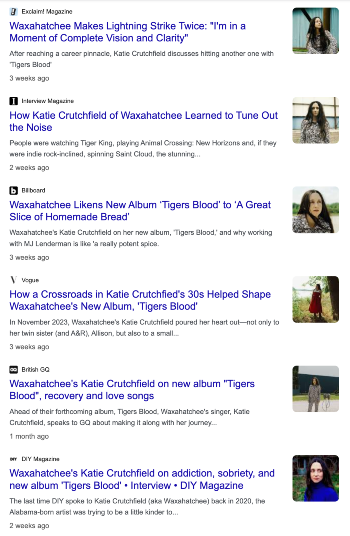
Listen [imagine my voice sounds like Steve Martin's at this moment] I think I understand what mainstream "music journalism" "is." Press releases are the scaffolding for the press coverage. Interviews build human interest in the art. And all of it is meant to drive album purchases and streams and concert ticket sales. But did I need to be sold? I'm already a fan.
There's a great bit in the Whit Stillman movie Metropolitan, where striving Princeton student Tom Townsend says, at a party, "I don't read novels. I prefer good literary criticism. That way you get both the novelist's ideas, as well as the critic's thinking." I thought that line was hilarious when I first saw it, and then I went out and fucking did it! I reached for the thinking instead of the ideas—for two albums, by two women whose work I have loved for years and years!
Ah, distracted by words. A classic me problem. I showed up to school with a big shiny apple, ready to read the text and provide some analysis. Blogger's delight: it wasn't that I didn't understand the assignment, it's that I treated it like an assignment in the first place.
At least for me, both Cowboy Carter and Tigers Blood are far better without the context. Beyoncé's album is sprawling, maximalist, and often straight-up weird. It's sexy and maternal, stained with blood and incapable of countenancing a lack of spaghetti sauce. It is about genre, but in a way that's way more interesting than the press release lets on. "Beyoncé", as a concept, is institutionally enormous at this point—American songbook huge. But all that text in her press release boils down to a line that occurs about halfway through the album: I ain't no regular singer. (And I should note, the "sing" syllable is pronounced more like "saaaaang.") We don't like Beyoncé because she made an album that is "a declarative frequency and academic shift." We like her because she isn't a regular singer, and she never has been, and she never will be.
Waxahatchee's album is radiant, languorous, and a little cryptic. The music is so relaxed, it's hard to recognize the unease running beneath it. "Right Back To It", for example, sounds like a chill song you'd play on the porch while nursing a cold beverage, and its chorus closes with a circular couplet: If I can keep up / We'll get right back to it. But the it is purgatorial—a song with no end, a relationship in its middle distance, a partner "hovering like a moth." I thought I liked Crutchfield's early work because it matched my youthful self-destructive tendencies. Well, "Right Back To It" is self-destruction in your thirties. It's quieter and calmer, soft doubt instead of harsh agony. There's no guarantee she can keep up. The "if" haunts the ease. I haven't outgrown Waxahatchee after all.
It's a little funny to write about not wanting to read music writing, in a music blog, but here we are. I had to write this because I couldn't figure out why all of the lead-up to these two albums was straining my enthusiasm, and I think I figured it out. An attention vortex opened up, and I fell in.
Music journalism is now 90% obsessive exegesis of about half a dozen megastars https://t.co/KdAtYXwpWD
— Dorian Lynskey (@Dorianlynskey) April 1, 2024
Tomorrow I will go back to writing mostly about artists who aren't in the attention vortex. That's part of my "beat," I think. I will get right back to it.
Thank u for reading I Enjoy Music. If u like it, tell a friend about it.
